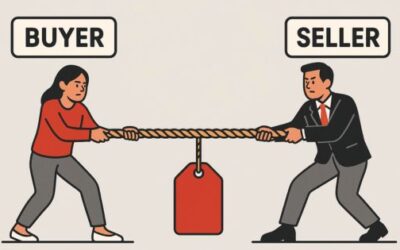A couple months ago we talked about how salespeople can be their own worst enemy. However, very little in life is black and white. Today, we’re going to talk about how companies can be the root cause of their sales teams’ failures.
It’s easy, and common, to point fingers at individuals when targets are missed. But, truth is, sales is a two-part system. Salespeople are the frontlines, but, without proper support from the company even the best will trip, stumble, and fall.
Get ready for a dose of corporate humility.
How Companies Fail Their Sellers
Whether they want to hear it or not, companies and their leadership play just as important of a role in the success of their sales team. Companies can fail their sellers in a million different ways, often without realizing it. At the core of these failures is a disconnect between what a company provides and what the sales team actually needs to succeed.
For example, companies may believe their product is competitive and refuse to believe it falls short, but it can. Companies may believe their sales support system is perfect, when in reality it looks good on paper but does little to provide real, practical assistance in the field. Inadequate onboarding, toxic cultures, unrealistic quotas, and a lack of essential training all fall on the companies shoulders.
Let’s break some of the most common ways companies fail their sellers into categories and create insurmountable odds for even the best salespeople.
Product / Market
Product and market issues can be major problems for sellers. First, some companies are trying to push uncompetitive products or they’ve priced themselves way too high for the value they are able to provide. Some companies fail to stay current on market trends resulting in slow product upgrades or improvements. Sellers are left trying to sell an outdated offering.
Companies that lack market understanding are hanging their salespeople out to dry. Misaligned strategies or messaging are a tall order for the sales team to overcome. Sometimes the company’s business model no longer fits the market and sellers are left trying to fit square pegs into round holes.
Lack of Support and Enablement
This should come as no surprise. Too many companies are failing to provide adequate sales support and enablement. This one is particularly irritating for sellers as it directly impacts their day-to-day.
Poor onboarding processes start new reps off on the wrong foot and playing catch up from day 1. Insufficient training holds teams back from being competitive in tightening markets. Many companies underestimate the importance of providing robust, modern tools along with proper implementation. When companies do not provide proper training and support they’re asking their sales team to fight with one hand tied behind their backs.
Culture and Leadership
The culture and quality of sales leadership can be the difference between winners and losers. Negative or toxic cultures demoralize sellers across the board generating high turnover and decreased production. When a company fails to foster a sales-oriented culture throughout the organization, teams feel isolated and unsupported.
Poor sales leadership magnifies any existing issues when unclear direction and inconsistent strategies are present. Micromanagement kills creativity and autonomy amongst sellers. Setting unrealistic expectations creates an environment of constant pressure and frustration.
Performance Management
Unrealistic quotas or that super strict quota policy isn’t making a company more productive. It’s doing the opposite. Unrealistic quotas create pressure that ultimately leads to frustration and disappointment.
Poor quota policies on either side of the spectrum are hurting sales organizations as well. Terminating an employee for missing quota two quarters in a row, regardless of the situation at hand, is equally as irritating as being too lenient and holding on to consistently underperforming reps.
Marketing / Lead Generation
An ineffective marketing department that results in poor brand awareness and messaging that doesn’t resonate with the right audiences makes sales’ job that much harder. Similarly, a lack of lead generation forces sellers to spend time prospecting rather than engaging with qualified leads.
Poor territory development can create imbalanced workloads and missed opportunities. When companies miss in these areas, sellers take it on themselves to generate interest and awareness as well as guiding prospects through sales cycles. This added burden will eventually impact the team’s efficiency if it isn’t already.
Corporate Humility
In light of the ways companies can undermine their sales teams, it’s time to introduce a new concept: corporate humility. If, as the Supreme Court has said, companies are to be considered “people,” then they need to start developing humility as well and take responsibility for their role in sales team failing.
Far far too often, when targets are missed, the finger pointing starts with the sellers. But, as we just laid out, downtrends in sales numbers can very much so be the company’s fault. Corporate humility means acknowledging that sales triumphs and losses are a shared responsibility. It implores companies to assess their policies, practices, and cultures as much as they want sellers and managers to assess theirs.
Rather than blame sellers, we must create a balanced and realistic view of what drives performance.
As leadership, we must take a hard look at ourselves and how our companies are being run. Are we providing our sales teams with competitive products? Is our culture fostering success or breeding frustration? Are the sales support systems we have in place helping or hurting?




0 Comments